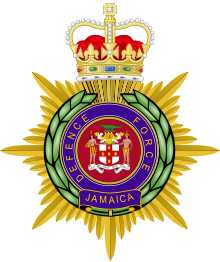Jamaican Coast Guard
| Jamaica Defence Force | |
|---|---|

Jamaica Defence Force badge
|
|
| Headquarters | Up Park Camp, Kingston |
| Leadership | |
| Minister of Defence | Andrew Holness |
| Chief of Defence Staff | Major-General Rocky R. Meade |
| Manpower | |
| Military age | 16 years of age for selection process, 17 years of age is actual serving age (As of 2007) |
| Available for military service |
747,043 males, age 16–49 (2005 est.) |
| Fit for military service |
523,550 males, age 16–49 (2005 est.) |
| Reaching military age annually |
27,729 males (2005 est.) |
| Expenditures | |
| Budget | $31,170,000 (ranked 141st) |
| Percent of GDP | 0.6%(2007) |
The Jamaica Defence Force (JDF) is the combined military of Jamaica, consisting of an Army, Air Wing and Coast Guard. The JDF is based upon the British military model, with similar organisation, training, weapons and traditions. Once chosen, officer candidates are sent to one of several British or Canadian basic officer courses depending upon the arm of service. Enlisted soldiers are given basic training at JDF Training Depot Newcastle. As on the British model, NCOs are given several levels of professional training as they rise up the ranks. Additional military schools are available for speciality training in Canada, the United States, and the United Kingdom.
The JDF is directly descended from the British West India Regiment formed during the colonial era. The West India Regiment was used extensively by the British in policing the empire from 1795 to 1926. Other units in the JDF heritage include the early colonial Jamaica Militia, the Kingston Infantry Volunteers of WWI and reorganised into the Jamaican Infantry Volunteers in WWII. The West India Regiment was reformed in 1958 as part of the West Indies Federation. The dissolution of the Federation resulted in the establishment of the JDF.
The Jamaica Defence Force (JDF) comprises an infantry Regiment and Reserve Corps, an Air Wing, a Coast Guard fleet and a supporting Engineering Unit. The infantry regiment contains the 1st, 2nd and 3rd (National Reserve) battalions. The JDF Air Wing is divided into three flight units, a training unit, a support unit and the JDF Air Wing (National Reserve). The Coast Guard element is divided between seagoing crews and support crews. It conducts maritime safety and maritime law enforcement as well as defence-related operations. The support battalion contains a Military Police platoon as well as vehicle, armourers and supply units. The 1st Engineer Regiment provides military engineering support to the JDF. The Headquarters JDF contains the JDF commander, command staff as well as intelligence, judge advocate office, administrative and procurement sections.
In recent years the JDF has been called upon to assist the nation's police, the Jamaica Constabulary Force (JCF) in fighting drug smuggling and a rising crime rate which includes one of the highest murder rates in the world. JDF units actively conduct armed patrols with the JCF in high-crime areas and known gang neighbourhoods. There has been vocal controversy as well as support of this JDF role. In early 2005, an opposition leader, Edward Seaga, called for the merger of the JDF and JCF. This move has not garnered support in either organisation nor among the majority of citizens.
...
Wikipedia
